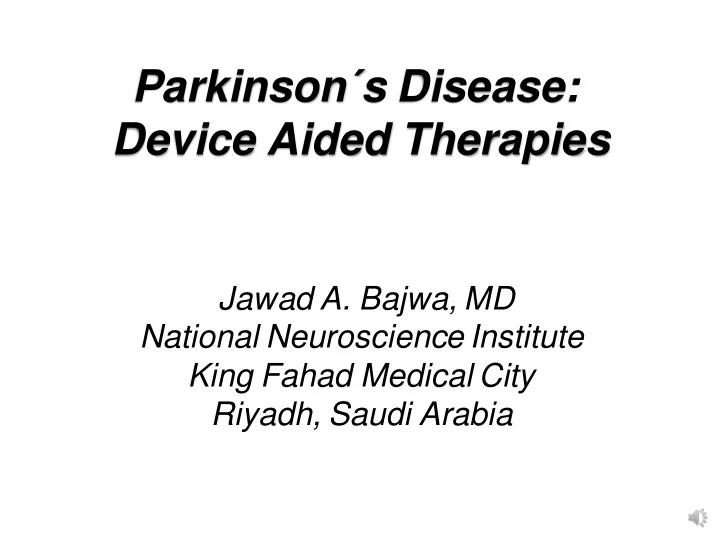

Parkinson ´ s Disease: Device Aided Therapies Jawad A. Bajwa, MD National Neuroscience Institute King Fahad Medical City Riyadh, Saudi Arabia
Objectives Why to Consider Device Aided Therapies Which Patient Profiles are Best Candidates Outcomes Timing
Six! Deep Brain Stimulation Apomorphine Infusion Levodopa Carbidopa Intestinal Gel Infusion High Intensity Focused Ultrasound Gamma/Cyber Knife-Radiosurgery Thermal Lesion Surgery
Why Intervene?
Wearing-off Wearing off: the re-emergence of symptoms before the next dose of medication Motor symptoms such as: Non-motor problems, • Bradykinesia such as: • Rigidity • Pain • Tremor • Autonomic symptoms • Postural instability • Mood
PD1 PD2 R L R L 4 4 4 4 4 4 4 4 4 4 4 4 UPDRS Finger Tapping Score UPDRS Finger Tapping Score 3 3 3 3 3 3 3 3 3 3 3 3 3 3 3 3 3 3 2 2 2 2 2 2 2 2 2 2 2 2 2 2 2 2 2 2 2 2 2 2 2 2 2 2 2 2 1 1 1 1 1 1 1 1 1 1 1 1 1 1 1 1 1 1 1 1 1 1 1 1 0 0 0 15 30 45 60 75 90 105 135 150 165 180 210 240 255 270 285 300 315 330 0 0 15 30 45 60 75 90 120 150 180 195 210 240 270 285 300 Medication giv en Time (minutes) Medication giv en Time (minutes) PD3 PD4 R L R L 4 4 4 4 4 4 4 4 4 4 4 UPDRS Finger Tapping Score UPDRS Finger Tapping Score 3 3 3 3 3 3 3 2 2 2 2 2 2 1 1 1 1 1 1 1 1 1 1 1 1 1 1 1 1 1 1 1 1 1 1 1 1 1 0 0 0 0 0 15 45 75 105 135 150 165 180 0 15 30 45 60 75 105 135 150 165 180 Medication giv en Time (minutes) Medication giv en Time (minutes)
Clinical Parameterization Inter-Patient Intra-Patient Variability Variability MDS UPDRS ON OFF Part-3 Many Shades of ON and OFF!
Who to Consider
Device Candidates ◼ Cardinal Symptoms ◼ Tremor, Rigidity, Akinesia/Bradykinesia, Freezing of Gait ◼ Medical therapy “ maxed out ” ◼ Motor (ON/OFF) fluctuations ◼ Drug-induced dyskinesias ◼ L-DOPA response ◼ Age ◼ Rule out Parkinson ’ s-Plus syndromes
Deep Brain Stimulation: General Concepts
Deep Brain Stimulation A new era for the treatment of neurological disorders To Improve quality of life Offer Hope for medically intractable patients
Deep Brain Stimulation (Target/Symptom Specific)
Indications of DBS ❖ Movement disorders ▪ Parkinson ’ s disease ▪ Essential Tremors ▪ Dystonia ▪ Other ❖ Chronic Pain ❖ Epilepsy ▪ Psychiatric disorders ▪ Depression ▪ OCD ▪ Tourrette ’ s syndrome ▪ TBI ▪ Cluster Headache ▪ Addiction ▪ Obesity ▪ Dementia ▪ Minimally Conscious State
Where We Are: Deep Brain Stimulation (DBS) Amplitude: 1-5 V Rate: 80-180 Hz Pulse Width: 60-240 μs STN STN ouman ’ s Johnson, et al. (2011) Y Neurological Surgery T extbook
The Multidisciplinary Approach Team of Specialists • Close Collaboration is • Essential • Neurologist • Neurosurgeon • Neurophysiology • Neuro-radiology • Psychiatry • Neuro-psychology • Anesthesiology • Bioethics
DBS for Parkinson ’ s Disease
bA Bajwa, JA. Johnson, M . Vitek, JL. Text Book of Functional Neurosurgery Lozano, AM 2008
DBS Programming DBS Programming ➢ Programming currently involves a trial process ➢ Location, Location, Location ➢ Assessment of clinical benefits and side effect ➢ Adjustment of medications
STN- DBS: Results
Pumps
LCIG Pump
Apomorphine Pump
Outcomes & Timing
Being Practical! Symptom specific and effectiveness: DBS vs LCIG vs Apomorphine Least Invasive and easy to do: Apomorphine vs LCIG vs DBS Patient Preference Cost
Key Messages! Keep in mind Window of opportunity Consider appropriate patient profiles Earlier intervention is an emerging consideration for well selected candidates (DBS) Future is defining PD syndromic heterogeneity and better biological phenotype clustering outcomes for device aided treatment
Recommend
More recommend